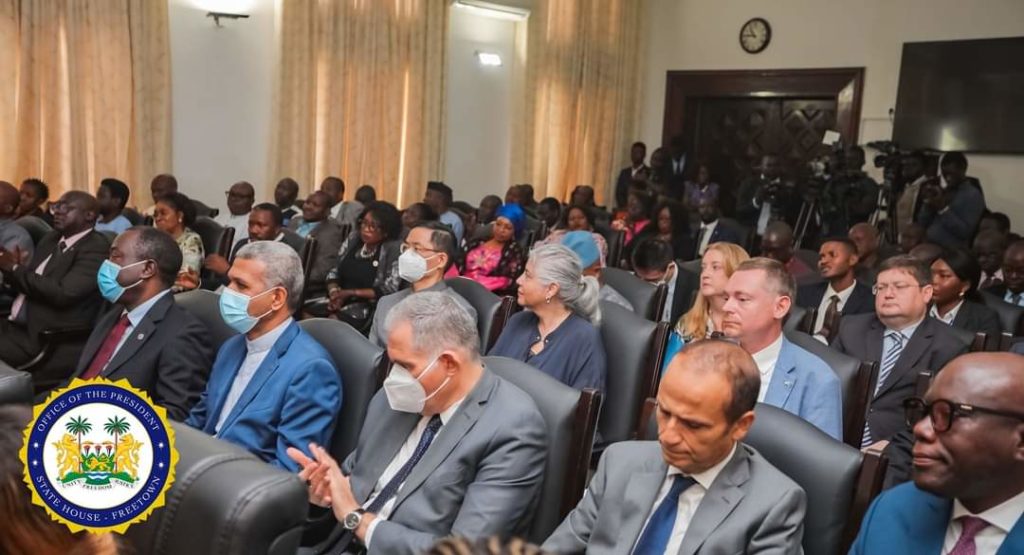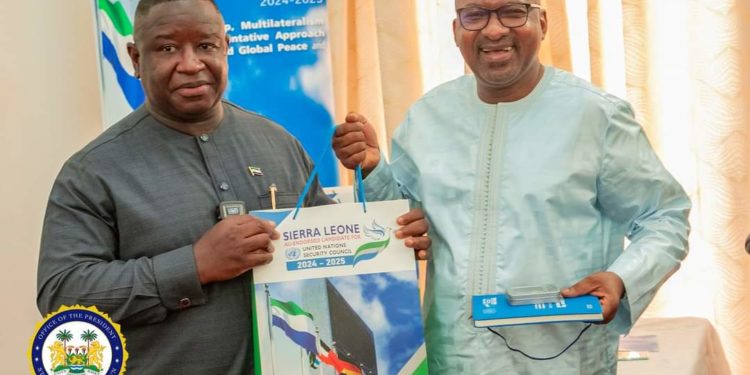Sierra Leone has launched a bid for a seat in the non-permanent category of the United Nations most powerful organ – the Security Council.
Sierra Leone is seeking to serve for the period 2024-2025, President Julius Maada Bio officially announced on Monday.
The United Nations is an intergovernmental organization with the goal of maintaining international peace and security through friendly relations among nations.
The Security Council (UNSC), one of its six organs, has the primary responsibility of maintaining international peace and security. Sierra Leone has served in it only once (1970 to 1971) since it joined the global body in 1961. It was the 100th of the 193 member countries to join the global body.
President Bio told an audience of government officials and diplomats at a State House ceremony that those two “unforgettable” years served as “bold footprints” that continue to define the country’s commitment to its international obligations and its unflinching support for a multilateral rules-based world order to advance and sustain global peace and security.
“Fifty plus years after our 1970-1971 tenure on the Security Council, we are once again presenting Sierra Leone’s candidature for a seat in the non-permanent category of the United Nations Security Council for the period 2024-2025,” the president declared.
The launching was done on the theme: “Partnership, Multilateralism and Representative Approach to Sustained Global Peace and Security”.
Sierra Leone’s bid for a seat in the UN’s top decision-making organ has been on for some time now. Reports suggest that the Bio administration has embarked on international diplomatic missions to mobilize support for its candidature.
According to President Bio, Sierra Leone’s candidature has already been endorsed by the African Union. And the Ministry of Foreign Affairs says the country is the sole African candidate for the position, which increases its chance at getting the seat.
Voting for the position is slated for June at the next UN General Assembly in New York.
Sierra Leone is selling its candidature using its experience as a war-ravaged country which turned its fate around to be an exporter of peace. In his statement, President Bio said Sierra Leone could today proudly boast of its credentials as a successful model of peacebuilding and post-war state reconstruction.
“We owe it to the global family of nations to share our experience and lessons in peace-making, peacekeeping and peacebuilding,” he notes.
Bio also argues that Sierra Leone believes in an inclusive and consultative approach to peace that thrives on the consensus of UN Member States in pursuit of common values and collective solidarity, irrespective of size, population and economic and military power. He stresses that Sierra Leone will use its tenue to support priorities that strengthen and address partnership and representation in the maintenance of peace and security, with a focus on human rights protection and promotion as well as building confidence in democratic governance.
Bio adds that the direction of Sierra Leone under his leadership in the last four years is testimony to the country’s commitments to these values, citing the abolition of the death penalty, the joining of the International Religious Freedom Alliance and the repeal of the seditious libel laws.
Bio further pledges to use Sierra Leone’s seat to advocate for the ownership and active involvement of women and youth in peace processes and peacekeeping operations as peace mediators. He says it will also focus on threats to peace including terrorism and new threats (climate change and human security).

According to the Sierra Leone government, the country’s bid for a seat in the coveted body of the UN isn’t about its interest alone, it’s also part of its effort to attain a continental dream of the reform of the UNSC.
Sierra Leone has been heading the African Union Committee of Ten (C-10) charged with championing the continent’s position on the reform of the UN over the last 10 years.
President Bio, who is the coordinator of the C-10, inherited the chairmanship from his predecessor Ernest Bai Koroma.
Among others, Africa wants to have two permanent representatives at the USC and an additional two states as non-permanent representatives, as enshrined in the Ezulwini Consensus and Sirte Declaration. This is also known as the African Common Position.
Presently the UNSC comprises 15 member countries, only five of whom are permanent members: China, France, Russia, United Kingdom and United States. Collectively known as P5, any of these five powers can veto a resolution.
The remaining 10 members are elected to serve a rotating two-year, non-consecutive terms, without the veto power.
Africa usually has two to three seats in the 10 non-permanent member slot, which are currently occupied by Kenya, Ghana and Gabon.
In addition to having two permanent seats and two more non-permanent seats, the AU wants same rights, privileges and obligations accorded to the current permanent members, including the right to veto, for its permanent members.
President Bio appeals for local support, noting that Sierra Leone’s bid is such a monumental task that couldn’t depend on credentials alone, stressing that the responsibility of canvassing support for the country does not also lie with the Presidency and the Foreign Ministry alone. He called for the support of the civil society and media.






















